1946: Martha Vickers in "The Big Sleep"
 Saturday, June 5, 2021 at 5:00PM
Saturday, June 5, 2021 at 5:00PM Each month before the Smackdown event, suggested options for an alternate ballot in Best Supporting Actress...
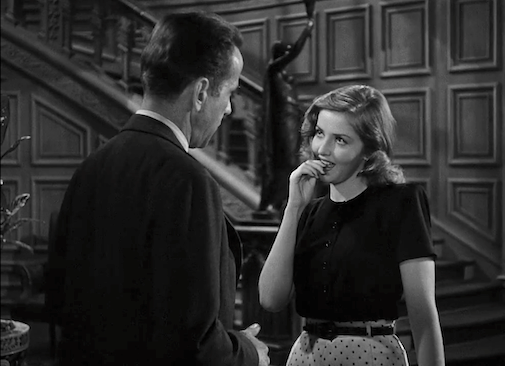
by Nick Taylor
How is it I've ended up watching three Bogie & Bacall collaborations in reverse chronological order while celebrating the Smackdown years? At least this means that their pairings have only grown more rewarding, rather than less. I’d probably rank To Have and Have Not ever so slightly above The Big Sleep, but boy is it a twisty, entertaining film, making real cinema out of Raymond Chandler’s novel without sanding away his cynical wit and venom (This write-up is based on the 1946 version of the film, rather than the substantially reorganized and shorter 1945 cut). The Big Sleep also boasts the only real instance in any of these films of a supporting performer truly overshadowing the star couple for sheer charisma and watchability. That actress is Martha Vickers, in the role of Lauren Bacall’s drug-addicted, nymphomaniac sister Carmen Sternwood. If it’s one thing for Moorehead to walk away with a barely-there film like Dark Passage, it’s an entirely different feat to watch Vickers’ intense, dangerous, but visibly curtailed supporting turn swipe the whole movie out from under Bogie and Bacall at very nearly the top of their game.
Before getting into Vickers’ performance, it’s worth sharing a bit of Hollywood history that explains why Vickers is in less of the film than one might be expecting...
The Big Sleep was rewritten a bit in production to emphasize the new craze of Bogart and Bacall’s screen chemistry, giving them a couple extra scenes and plenty of attention in the advertising. After being completed, the film was delayed a few months so Warner Bros. could send out the last of their World War II movies while the end of the war was still fresh. At some point in all that waiting, it was recognized that Vickers’s performance was so incendiary that she was upstaging this newly minted star couple, and several of Carmen’s scenes were omitted from the final cut. I’ve heard the credit for spearheading the decision to axe Carmen’s scenes ascribed to a few different sources - most often Bacall or the Warner Brothers themselves - but the end result is still the same. Carmen is both a deeply central instigator of The Big Sleep and a somewhat unwelcome guest who exits earlier than you’re expecting, in a scene that plays in no way like a final goodbye.
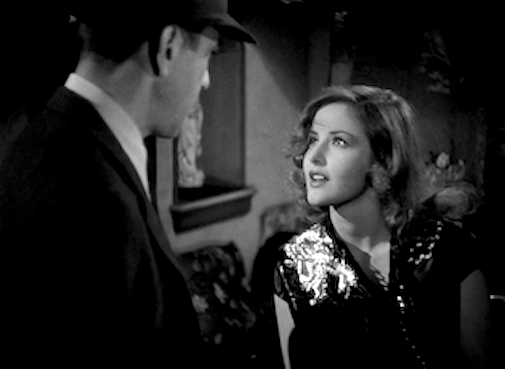
Not to spin this horrible fucking-over of a talented, up-and-coming actress into a productive tension of my experience of her film, but given how radically this information colored my ideas about The Big Sleep and Vickers’ work in it, there’s something that feels genuinely transgressive about her presence. Carmen always feels like she’s entering a scene that didn’t originally call for her, disrupting it by the sheer fact of her being there at all. You begin to stay on guard for her as you watch the film, waiting for when she’ll next hijack the whole picture for the sake of her own id. More than that, she never acts like one imagines she’s supposed to, taking some fairly perfunctory scenes and seizing them so thoroughly it's hard to know how to respond.
This is all present from her first scene at the very start of The Big Sleep, walking down the stairs and intercepting Philip Marlowe (Bogie) as he waits in the foyer of her family’s mansion to meet with her father, General Sternwood (Charles Waldron, excellent). Dressed in a dark, button-up top and polka-dotted white skirt, everything from Carmen’s outfit to her body language to the fire in her eyes suggests a girlish persona that’s seamlessly warped with some more voracious, grown-up appetites. She tells Marlowe he’s not that tall like it’s a come-on before quizzing him on his name and occupation. The whole time she’s sizing him up, only breaking eye contact to look him up and down again. She can’t stop playing with her hair either, twisting it between her fingers and nearly teething it before tossing it behind her in some faux-glamorous gesture. Carmen ends the interaction by suddenly falling towards him so he can catch her, luxuriating in his arms before they’re interrupted by the butler. Without a word she gets up out of him and goes off to wherever she was headed in the first place.
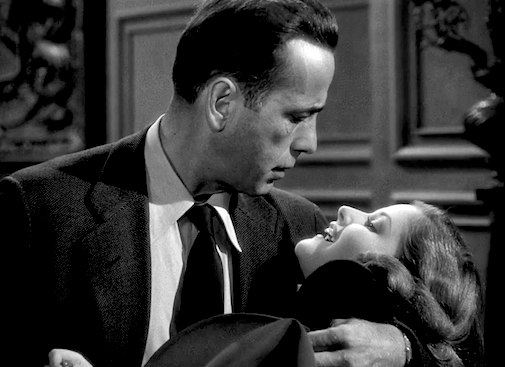
Carmen’s father describes her as “a child who still likes to pull the wings off butterflies”, and credits some “vices of their own creation” to her and her sister Vivian (Bacall) to further try and explain their neuroses. Still, one wonders if the General should’ve called her “spoiled” and “ruthless” like he did Vivian. You couldn’t really say if Carmen is simply a young girl acting beyond her years or a grown woman with some stunted attitudes - possibly both, to some degree, but she’s neither overly pathologized by the script nor played in a limiting way by Vickers. Frankly, everything about Carmen is fully on display here - her nymphomania, her willingness to throw herself in dangerous situations for her own benefit, her weird girlishness - yet listing it out undermines how fully Vickers inhabits these qualities in her lilting gazes and quivering intensity. She sucks on her thumb like she’s Max Cady carnally, carnivorously offering it and Danielle Bowman willingly accepting it, not necessarily naive or incapable but unquestionably overestimating herself in even considering it.
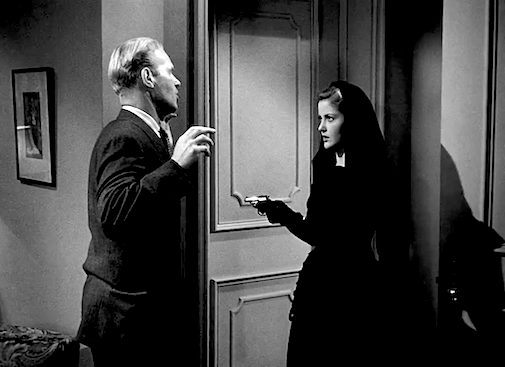
It’s almost besides the point to talk about early American noir in terms of archetypes, especially in relation to films that were pioneering them. This perhaps goes doubly for adaptations of Chandler, who writes his women in a way that sometimes comes across as a series of moods, angles, colors, and body parts. Having Howard Hawks direct is certainly a huge asset towards ensuring The Big Sleep is able to present tangible characters while holding on to the script’s genre complexities. Nevertheless, it’s just as beneficial to have such resourceful interpreters as Vickers, Bacall, Dorothy Malone, and Sonia Darrin gracefully dodging stereotype without underplaying what’s suspicious, intelligent, erotic, and crafty about their characters.
I should also give a shout-out to costume designer Leah Rhodes, who keeps finding the right outfits to make Vickers look like a knockout while underlining exactly the right irony about Carmen in each scene. Her first outfit is casual, affluent, and astonishingly normal, contrasting nicely with everything discordant about Vickers’ playing. My favorite outfit is the all-black ensemble with a jacket and hood Carmen wears to retrieve some incriminating photos of herself taken while she was high as a kite. The negotiation for the pictures between Marlowe, Vivian, and the couple in possession of them had been going on for several minutes. Carmen forces her way into the hotel room, holding a man at gunpoint and looking like she just finished posing as a Madonna for a religious portrait, yet her appearance amplifies the perversity of the already lurid contexts. She’s murderously charged but steady in her hand, and when she asks Marlowe for the photos she’s as coquettish and aroused by him as when they first met.
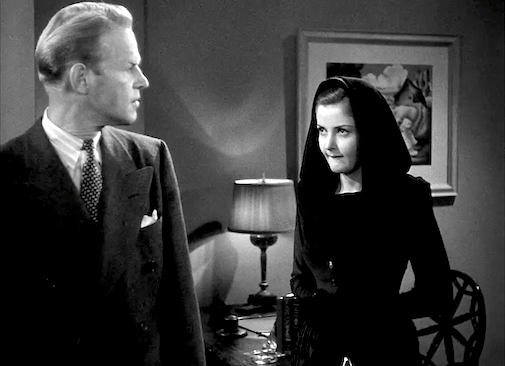
Vickers, more than anyone in the cast, avoids easy pigeonholing or simple explanation for who her character is and what she wants. She’s too keyed in to Carmen’s youth and instability to truly qualify as a femme fatale. There’s a strange autonomy to the role, as Carmen seems to willingly walk into the traps her family so often must rescue her from, but Vickers contextualizes this with a wanton, amused hedonism that’s so reflexive it barely seems aware of itself. She doesn’t try to make Carmen’s personality less transgressive or unstable in favor of a more coherent, explicable woman. The way she fluctuates between scenes in arousal, intoxication, anger, and comfort are the closest thing to an arc Vickers gives us, immersing so deeply in Carmen’s impulsiveness that the connective threads for “why” she’s suddenly entered a scene are only revealed partway through, occasionally by someone else. There are calculations behind Carmen’s choices, but they’re more sudden, sometimes desperate impulses compared to the slickly designed cons Vivian is occasionally able to try on Marlowe. She’s able to sneak into Marlowe’s office, yes, but she falls asleep waiting for him to arrive and is too high to really attempt to seduce him once he’s there.
All this to say there’s a real sense of danger whenever Carmen walks back into the film, regardless of if she’s drugged out of her mind and barely able to speak or pointing a gun with every intention of using it. Every time she’s had her way The Big Sleep it feels like a slightly different movie, forcing the other characters to once again reckon with how easy it is to be caught off guard by someone who can’t stop showing her hand. Vickers is as direct a forerunner to the mercurial genius of Fiona Shaw in The Black Dahlia as I’ve had the pleasure to witness, even as she’s cruelly denied the same showstopping finish that makes Shaw so indelible in her film. It’s the most glaringly obvious omission of her role in the whole film, and The Big Sleep nearly fails to stick the landing by relegating her into a character that’s only talked about rather than one who gets to say exactly how crucial she was or wasn’t to the crimes Marlowe was hired to investigate. And yet, Vickers is still a ferociously memorable figure, seizing scenes that are rarely shaped as “hers” with such fire that it’s impossible to look away from her whenever she’s onscreen. And Carmen wouldn’t want you to stop looking at her, now would she?
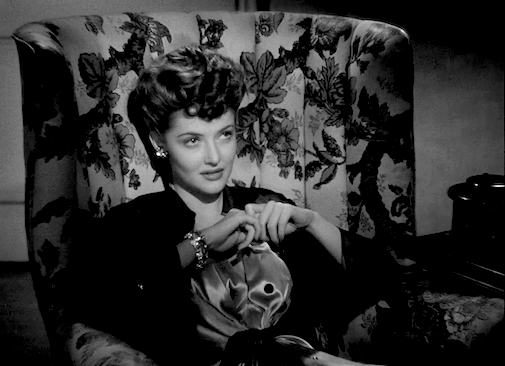



Reader Comments (8)
I'm not the biggest fan of The Big Sleep, to me it was often muddled, but Martha Vickers is sensational in it and it would have seemed to bode a great future for her. That it didn't I think is on Warners who apparently were at a loss on how to cast her despite this crystal clear example. Afterwards she was almost invariably cast as sweet young things, mostly decorative and then her career lost steam and petered out into one of no great distinction.
Luck didn't seem to be on Martha's side though what with the studio mismanaging her career, one of her three husbands being the serial matrimonialist Mickey Rooney and then dying of cancer at only 46 years old. Fortunately she at least left behind this piece of work to see the potential she had to offer.
Also Claire Trevor and Edward G Robinson steal the show in Key Largo. Maybe Bogie and Bacall just weren’t that great?
Vickers' firecracker of a turn in "The Big Sleep" has been much admired over the years.
But never so beautifully examined and assessed. You've given us the detailed, vividly appreciative review this performance has always deserved. Thank you. She and Dorothy Malone should both have been in the supporting Oscar hunt that year
While my head always goes to Dorothy Malone when I think of the supporting performances in this, I enjoyed appreciation of Vickers' work. Well done.
Vickers pulled off one of cinema's biggest heists by stealing this picture so obviously and definitively. I can't think of its equivalent, except maybe Judith Anderson in Rebecca.
@joel6 - I remember watching her in The Burglar and being shocked and how much that film seemed to be activity working against her performance. She’s clearly talented, but you gotta wonder what she could’ve done if more movies let her shine.
@John - It also doesn’t help in Key Largo or Dark Passage that their dynamic so decentralized from the main story. At least Big Sleep and To Have and Have Not have the good sense to make them the focus while also stacking the rest of the cast. They’re talented, but you can’t take that kind of chemistry for granted.
@Ken and Scott - Thank you!! And I completely agree on Malone. What a sensational scene.
@Vickers - Edward G. Robinson in Double Indemnity with the first person I thought of when you said that. Something real special about this kind of theft under the star system.
Thank you for this, Nick. Def need to watch this - like, finally.
Such a great writeup of Vickers work. I almost want to revisit the film simply to experience her work yet again. Martha delivers one of many performances which while great were sadly lessened by studio involvement/hayes code meddling.
Special shout out to Dorothy Malone who is one of the greatest one scene wonders every captured on film. So much charisma I feel that if I were watching the film upon its initial release and there was the internet Malone would be destined soon to have a big Oscar moment (which thankfully she did.)